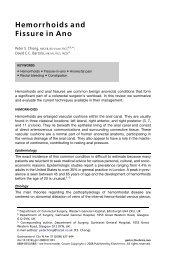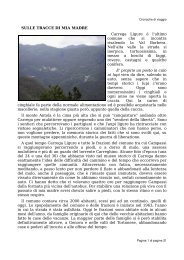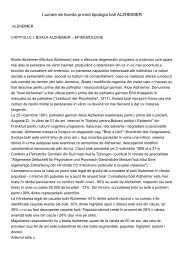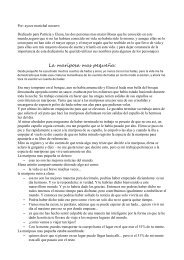Other People's Wars: A Review of Overseas Terrorism in ... - Edocr
Other People's Wars: A Review of Overseas Terrorism in ... - Edocr
Other People's Wars: A Review of Overseas Terrorism in ... - Edocr
You also want an ePaper? Increase the reach of your titles
YUMPU automatically turns print PDFs into web optimized ePapers that Google loves.
<strong>Other</strong> Peoples’ <strong>Wars</strong> – Chapter One<br />
rank and file (as well as the leadership) <strong>of</strong> many terrorist groups. It is hard to imag<strong>in</strong>e<br />
any Police Force or Fire Department seek<strong>in</strong>g to hire such people, although a few armies<br />
have done so over the centuries.<br />
It might be an over-simplification, but the sheep dogs (firefighters, police, soldiers and<br />
such) might be <strong>in</strong>dividuals who seek authority and validation, but they also have an ethic<br />
<strong>of</strong> service, and an impulse to protect. This is someth<strong>in</strong>g that seldom can be said about<br />
coyotes or terrorists.<br />
The attraction towards a strong ideology also lies with <strong>in</strong>ternal characteristics. The<br />
world <strong>of</strong> terrorism is rife with “histories <strong>of</strong> childhood deprivation and narcissistic<br />
wounds … with a deficient sense <strong>of</strong> self-esteem, and <strong>in</strong>adequately <strong>in</strong>tegrated personalities<br />
… loners, alienated <strong>in</strong>dividuals who did not fit … extreme extroverts – the self centered<br />
<strong>in</strong>dividual with little regard for the feel<strong>in</strong>gs <strong>of</strong> others … neurotic hostility … project<strong>in</strong>g<br />
the person’s own hostility onto the social environment.” 15<br />
The one sure lesson to draw from this is that the cause a terrorist espouses has little to<br />
do with the need to commit violence, but the cause they adopt will certa<strong>in</strong>ly shape the<br />
violence that they undertake. A terrorist is someone already predisposed to violence and<br />
the cause is secondary to its use as a justification. For example, among those who have<br />
attacked Israelis with terrorism, a full spectrum <strong>of</strong> ideologies from nationalist, Marxist,<br />
leftist, radical right and religious sources have been pressed <strong>in</strong>to service to shape and<br />
justify their attacks.<br />
Admittedly, some terrorists do have causes that might justify violence, although they<br />
usually first elim<strong>in</strong>ated or suppressed all those who recommended a non-violent approach<br />
to the cause. <strong>Other</strong>s have had to create a cause or adapt an exist<strong>in</strong>g ideology to excuse<br />
their <strong>in</strong>tended behavior. It is not so much that the ends justify the means for a terrorist, it<br />
is rather that the means are attractive enough to require the <strong>in</strong>vention <strong>of</strong> an end.<br />
H<strong>of</strong>fer discusses the mutability <strong>of</strong> belief <strong>in</strong> his book on ideologues and po<strong>in</strong>ted out – for<br />
example – that <strong>in</strong> the early 1930s, German Nazis and Communists regarded each other as<br />
an excellent source <strong>of</strong> recruits. 16 The ability <strong>of</strong> Al-Qaeda to recruit H<strong>of</strong>fer’s “misfits” <strong>in</strong><br />
Western Society should not go unmentioned either, as they have recruited crim<strong>in</strong>als and<br />
aimless youths from non-Muslim backgrounds <strong>in</strong> Brita<strong>in</strong>, France and the United States,<br />
as can be ev<strong>in</strong>ced from John Walker L<strong>in</strong>dh (aka Abdul Hamid), the Courtailler brothers,<br />
Jose Padilla (aka Abdullah al-Muhajir) and Richard Reid.<br />
In the aftermath <strong>of</strong> the World Trade Centre bomb<strong>in</strong>g, Western attitudes and responses to<br />
it have largely gelled <strong>in</strong>to the traditional camps that endlessly debated strategy and<br />
approaches to previous ideological enemies <strong>in</strong> the 1930s and the Cold War. Those who<br />
14. Dr Jerrold Post, as cited <strong>in</strong> Invisible Armies (pg. 82) Dr Post is a psychologist whose papers on<br />
<strong>in</strong>dividual and group dynamics <strong>in</strong> terrorism between 1985 and 1990 have attracted much attention. Also<br />
see his paper “Individual and Group Dynamics <strong>of</strong> Terrorist Behavior” In World Congress <strong>of</strong> Psychiatry,<br />
Psychiatry: The State <strong>of</strong> the Art, 6, New York, Plenum, 1985; or “Terrorist Psycho-Logic: Terrorist<br />
Behavior as a Product <strong>of</strong> Psychological Forces”, Walter Re ich, ed., Orig<strong>in</strong>s <strong>of</strong> <strong>Terrorism</strong>; Psychologies,<br />
Ideologies, Theologies, States <strong>of</strong> M<strong>in</strong>d; Cambridge University Press, Cambridge, 1990.<br />
16 This relationship is also well illustrated by contemporary accounts from SA members – see Kurt<br />
Massmann’s anecdote “A meet<strong>in</strong>g hall brawl” <strong>in</strong> George Mossel’s Nazi Culture; Grosset & Dunlap, New<br />
York, 1966.<br />
10

















